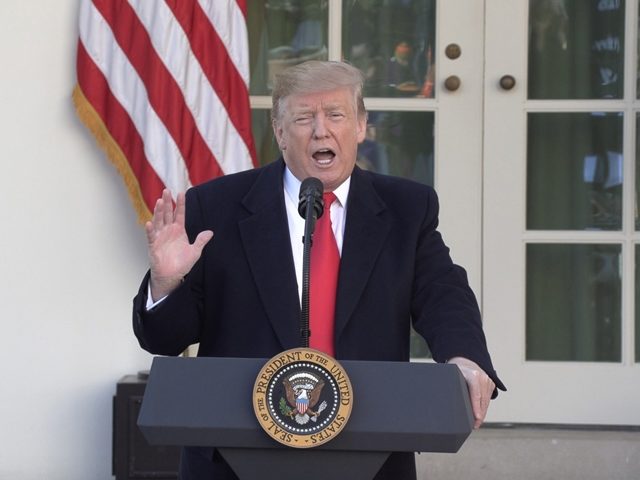President Donald Trump on Thursday pressed for a broader reopening of the United States as coronavirus-related job losses mounted, while parts of Europe embraced post-lockdown life.
With summer approaching on both sides of the Atlantic, more stores opened their doors and beaches welcomed tourists, despite the global number of virus cases passing five million.
The crisis of course is far from over – Russia and Latin America emerged as the next hotspots, even as Europe and the United States headed into the next phase, like Asia before them.
But Trump, with an eye on his re-election prospects in November, made it clear he hoped more state governors would move toward a loosening of anti-virus restrictions.
“We did the right thing but we now want to get going… you’ll break the country if you don’t,” he told African-American leaders in Michigan, a key election battleground state.
The Republican incumbent specifically talked about reopening places of worship — something he had initially hoped would be done by Easter Sunday — as important to the nation’s healing.
“People want to be in their churches,” Trump said. “They’re so important in terms of the psyche of our country.”
Trump has adopted the theme of “Transitioning Back to Greatness” as states reopen at different speeds.
While daily death counts are no longer on a steady incline, the losses are still mounting, with the total count in the US surpassing 94,000.
Trump ordered that flags at federal buildings be flown at half-staff for three days for the victims.
Another 2.43 million Americans were put out of work last week, the Labor Department said, bringing the total to 38.6 million since lockdowns were put in place, though the pace of job losses has slowed.
On the eve of Memorial Day weekend – the unofficial start to the American summer – beaches are slowly welcoming sun worshippers.
“We were just tired of waiting to get a normal life again, to get our freedom back. So we rented this big house by the beach,” said Anne Miller, an Ohio resident visiting South Carolina.
The same was true in Europe, where Cyprus bounded into its second stage of opening up, lifting curfews and allowing outdoor restaurants, barber shops and beaches to open.
But the Mediterranean island’s airports and hotels remain closed.I want my work back and my life back,” said Sakis Siakopoulos, a restaurant owner in the capital Nicosia.
In Denmark, the exit from lockdown also picked up pace as museums and zoos began reopening Thursday and health officials said the spread of the virus was slowing.
France, one of the countries hit hardest by the outbreak, saw its daily death count dip to 83 — cause for optimism.
A closely watched survey by IHS Markit indicated that the eurozone economy has now “likely bottomed out” as a result of the lockdowns, sparking hope that a recovery is to follow.
The number of known cases of COVID-19 has doubled in just one month, according to AFP data collected from official sources, with the death count nearing 330,000 worldwide.While many European countries have significantly curbed the contagion, Latin America is becoming a new hotspot with cases on the rise.
Brazil — now home to the third-highest number of cases in the world after the US and Russia — has now recorded more than 20,000 deaths, and hit a new record 24-hour count of 1,188.Grave diggers at the region’s biggest cemetery, located outside Sao Paulo, are scrambling to keep up.
“We’ve been working 12-hour days, burying them one after the other. It doesn’t stop,” said one worker at Vila Formosa, wearing a white protective suit, mask and face shield.Peru, Mexico and Chile have also seen steady increases in infections.
“It’s like a horror film,” Miguel Armas, a nurse at the Hipolito Unanue hospital in the Peruvian capital, told AFP.Trump has kept up a steady drumbeat of criticism against China, where the outbreak erupted last year, blaming its “incompetence” for the extent of the global crisis.
The government of Chinese leader Xi Jinping rejects that criticism, and insists it has been forthright with the world about the origins and unfolding of the crisis.It is neither responsible nor moral to cover up one’s own problems by blaming others,” said the spokesman for China’s legislature, Zhang Yesui.
China has made “major strategic achievements” in its response to the coronavirus outbreak, Premier Li Keqiang said as he addressed his nation on Friday about the virus, the economy and other hot-button topics at the start of a new legislative session.
Virus cases in the Asian giant are now down to a trickle, and Beijing insists its efforts to curb the spread of the virus have been a success, but questions remain about whether it underreported the number of people affected by the contagion.Governments around the world are testing ways to live with the dangers despite fears of a second wave of infections.
Already a common sight in Spain, masks were officially made mandatory Thursday for anyone over the age of six in public places where social distancing is not possible.The more tools we use, the better,” said Miguel Domingo, a 49-year-old architect taking his two dogs for a walk in Madrid, which is emerging from one of the toughest lockdowns.
But the director of the European Center for Disease Prevention and Control, Andrea Ammon, warned it was not a question of if there will be a second wave but “when and how big.””I don’t want to draw a doomsday picture but I think we have to be realistic,” she told Britain’s Guardian newspaper.








